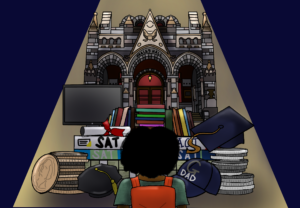Georgetown and 45 other Catholic colleges and universities submitted an amicus curiae brief on Aug. 1 in a pair of pending Supreme Court cases concerning the constitutionality of race-based affirmative action programs in college admissions. The brief argues that affirmative action’s promotion of a diverse learning environment is critical to promoting Catholic values such as social justice, promotion of the common good, and service to underrepresented groups.
Race-based affirmative action emerged in the late 1960s as a policy option for businesses and educational institutions to reduce structural barriers to access encountered by marginalized groups, especially students of color, who continue to face educational inequities. These policies, however, have long been politically controversial and are regular targets of conservative activists, who argue that they discriminate against white people.
Despite the many legal challenges to voluntary affirmative action programs in the past, the Supreme Court has upheld the ability of schools to take race into consideration when admitting students. In Regents of the University of California v. Bakke (1978), the Court ruled that universities could consider race as a factor in admissions but could not create specific, numerical quotas for underrepresented students. In 2003, the Supreme Court maintained its precedent in Grutter v. Bollinger by affirming that race-conscious affirmative action programs are constitutional, so long as schools do not base admissions decisions solely on race.
The currently pending cases—Students for Fair Admissions, Inc. v. President and Fellows of Harvard College and Students for Fair Admissions, Inc. v. University of North Carolina—ask the Supreme Court to overturn its decision in Grutter v. Bollinger, and instead, to require schools to be completely race-neutral in their admissions decisions. Because the Supreme Court has grown more conservative since its 2003 decision, some argue that it is likely to declare existing affirmative action programs to be unconstitutional.
The two cases involve lawsuits against Harvard College and the University of North Carolina (UNC) for allegedly discriminating against white and Asian American students in admissions decisions. Students for Fair Admissions (SFFA), a nonprofit advocacy organization that opposes race-based affirmative action in college admissions, brought the lawsuits against the respective schools.
SFFA alleges that Harvard College’s admissions discriminate against Asian American students in violation of Title VI of the Civil Rights Act of 1964, which prohibits discrimination based on race in any program or activity that receives federal funding. Harvard, though a private institution, is subject to Title VI because it receives federal funding.
SFFA also alleges that UNC discriminates against white and Asian American students in its admissions. Because UNC is a public university, it is subject to Title VI as well at the Fourteenth Amendment’s equal protection clause, which prevents public institutions from discriminating against citizens based on race.
While the Supreme Court will not release a decision on the cases until 2023, interested parties that are not formally involved in the lawsuits can submit opinions to the Court. These submissions, known as amicus curiae briefs, offer additional perspectives that the Supreme Court may consider in its deliberations.
The amicus curiae brief submitted by the 46 higher education institutions, including the University of Notre Dame, Boston College, and Villanova University, argues that race-based affirmative action in admissions is important to their religious objectives. Central to the Catholic faith is a commitment to the common good and social justice, which include ensuring that disadvantaged and underrepresented groups of students—namely low-income students of color—have access to the same educational opportunities as their counterparts.
Students of color are more likely to face barriers to educational achievement due to factors such as lower school funding, larger school and class sizes, fewer technological materials, and less access to advanced curriculum offerings. The schools argued that affirmative action would foster greater diversity, a tenet emphasized in Catholic teachings, by mitigating these barriers.
“Diversity creates a learning environment that furthers the pedagogical goals of Catholic colleges and universities, including rigorous thinking, understanding of and empathy toward people of different backgrounds, concern for the poor and underserved, and leadership in service to others,” the brief reads. Education in a diverse environment “serves Catholic values of respect for universal human dignity and divine creation, and in turn creates alumni equipped to contribute to Catholic goals of leadership in service.”
The universities further argue that preventing schools from considering race in admissions would violate the First Amendment’s free exercise clause, which protects the right to freely practice religion.
“A tenet of Catholicism is that ‘communion is enriched by respect and appreciation for differences within an overall perspective that advances the common good,’” the brief reads. “In an educational setting, the Catholic mission is ‘enriched by the presence and voices of diverse scholars and students.’”
The Supreme Court will hear arguments for the cases on Oct. 31, 2022. It will likely release a decision in mid-2023.






